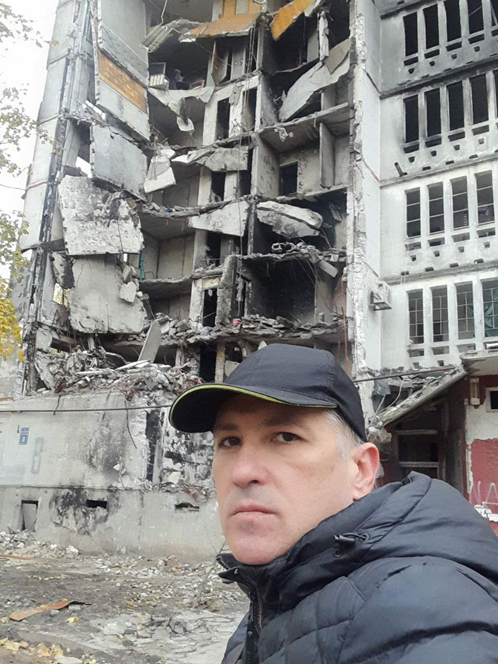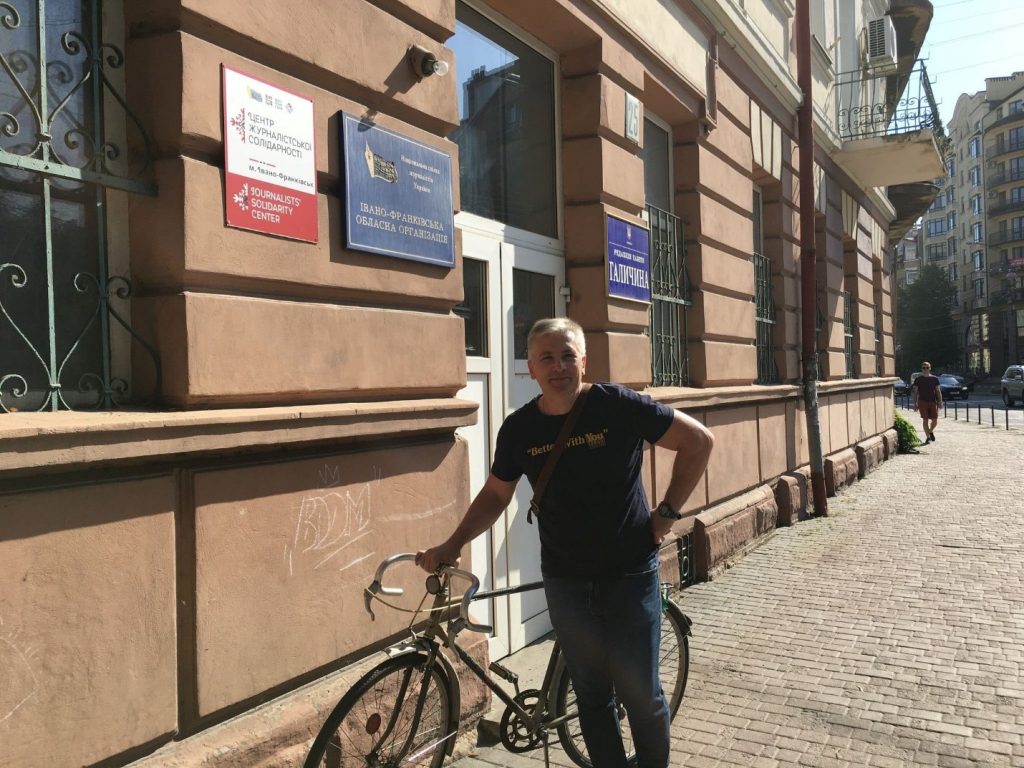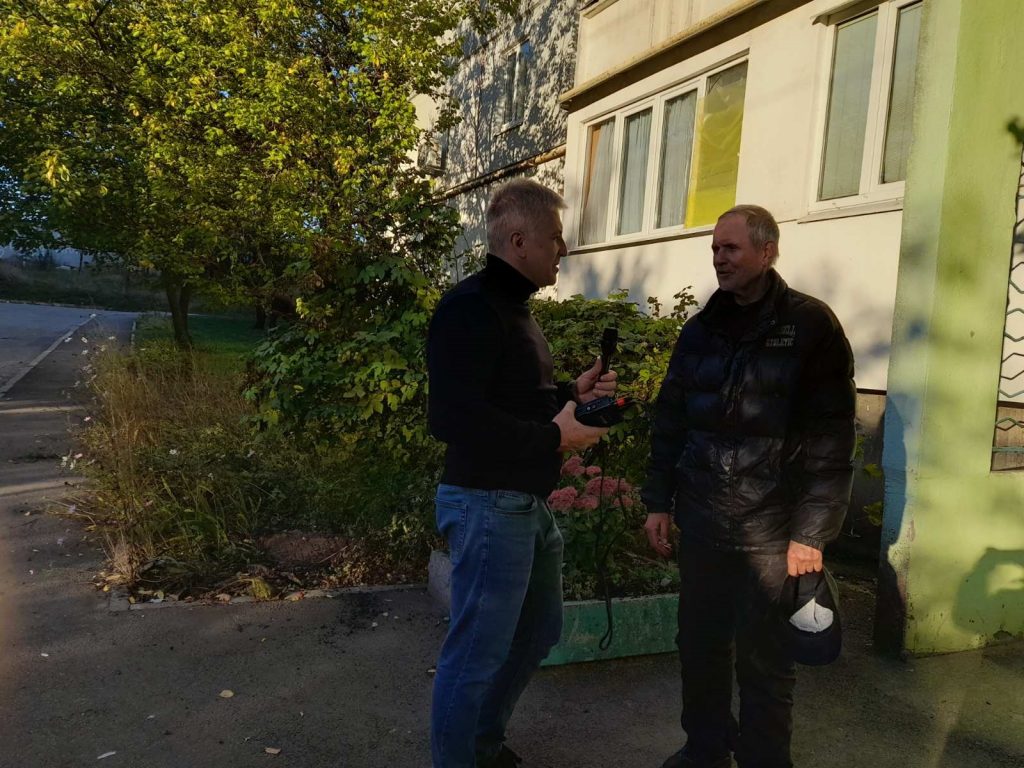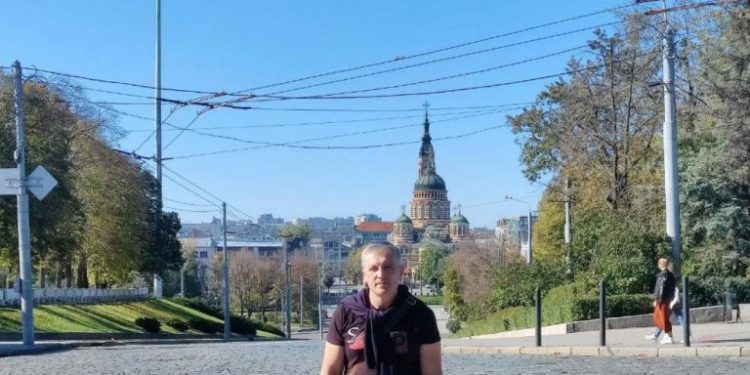Roman Kryvko – a seasoned journalist with 17 years of experience, hailing from Kharkiv, his lifelong home. Having grown up, pursued his education, married, and seen the birth of his sons in the city, he found himself amidst a harrowing ordeal. On the early morning of February 24th, a powerful explosion shattered the windows of his apartment balcony, he urgently evacuated his family and then had to save himself. In an exclusive interview with the NUJU, Roman recounted the initial blasts, the ensuing chaos in the city, the heart-wrenching separation from his family, and, ultimately, his return home. The conversation took place in Ivano-Frankivsk, where Mr. Kryvko found professional support at the Journalists’ Solidarity Center.
«People couldn’t believe that such a thing could happen.»
— On February 24th, around 5 in the morning, my wife started waking me up. I opened my eyes and asked, ‘What’s happening?’ She replied, ‘Can’t you hear it? Listen!’ That’s when I heard muffled explosions. It turned out that, at that moment, the windows on our balcony were already gone. We began quietly getting ready to leave. I went to the garage to get the car. Walking there was a challenge due to the shattered glass from the windows in the stairwell. Honestly, I thought I wouldn’t make it. Outside was already a crowd of people with their belongings and pets. Some were crying. Eventually, I managed to get the car, and we drove away, — recalls Roman.
Leaving Kharkiv was far from easy. Traffic jams paralyzed the city. Roman wished it could be the plot of an apocalypse movie, but with frightened children by his side, chaos all around, and the sounds of explosions in the distance, it brought him back to a terrifying reality. He had to come to terms with the fact that what was happening right before his eyes was irreversibly changing the lives of all Ukrainians.
— It was like in an American blockbuster when something happens, and people start leaving en masse. No one cared about traffic lights because everyone wanted to break through the intersections quickly. Such a scene had never been witnessed in Kharkiv before. People couldn’t believe that such a thing could happen, so nobody was prepared for the evacuation, — the journalist recalls.
For several days, the family resided in a village near Kharkiv with relatives. Eventually, the wife and the younger son left the country, while the elder son chose to stay with his father. On March 1st, they all returned to Kharkiv.
— We arrived home, and compared to North Saltivka and the city center, things were relatively calm. I continued to work remotely for the radio. However, on March 6th, the Russian occupiers shelled the Kharkiv TV Tower, making it impossible to continue working as before, — Roman recounts. — So, I decided to go on air for National Radio, where I daily reported on the situation in the city.
By the end of March, the shelling intensified significantly. There were frequent power outages, and we had to rely on water brought in from outside. Living under such conditions was challenging, and continuing to work became even more difficult. Roman and his son had to leave Kharkiv, though it weighed heavily on their hearts.
— We sat down and checked the evacuation train schedule in advance. Thankfully, it was well-organized. We saw there was a train heading to Uzhhorod. Well, Uzhhorod, so be it. When we arrived at the station, there weren’t many people. Almost at the last moment, a station employee came and revised the schedule: instead of Uzhhorod, it was now heading to Ivano-Frankivsk. And that’s how we ended up going to Ivano-Frankivsk — Mr. Kryvko shares his journey.

In Ivano-Frankivsk, they spent several days in a hostel. Later, Roman got in touch with his colleagues from Suspilne (National Public Broadcasting Company of Ukraine), and they helped him find accommodation. Thanks to the Ivano-Frankivsk Center for Journalistic Solidarity, an office and equipment were provided, and along with them, his beloved work returned.
— I was given an office with a computer, internet, and the National Union of Journalists provided me with a recorder – an essential tool for my work. This allowed me to get back to creating programs and connect with many journalists who were also forced to leave their homes, — the radio journalist recounts.
Gradually, Roman adapted to life in a different city, away from his wife and younger son and far from his faithful friends in Kharkiv. To keep a piece of beloved Kharkiv close to his heart, he bought a bicycle – not just any bike, but one manufactured in Kharkiv.
— The bicycle was not new – he found it through an advertisement. However, it turned out that it needed significant repairs, and no specialists wanted to take on the job. Everyone advised me to “sell it – get rid of the troubles,” but I couldn’t abandon my “fellow countryman” in distress. Then someone suggested a master – Mykola Bahriy, a former cycling coach who had trained many outstanding athletes in the former Soviet Union. He agreed to fix my bicycle, — Roman says joyfully. — He put in new spokes, re-centered the wheels, and, most importantly, taught me how to use it because it had a sporty handlebar, and I had never ridden such a bike before.

In October, Roman finally decided to return to Kharkiv for a few days because of the ongoing preparations for the heating season. He says that what surprised him the most was that life in his city was still bustling amidst the backdrop of shattered high-rise buildings.
— When I returned, I couldn’t hear any more shelling. The city was alive, and almost everything was functioning. But not in North Saltivka, where I used to live and where my home was. People came there mostly to close down their homes. There was even a joke circulating, ‘If you don’t have OSB boards on your windows, you’re not like everyone else.’ But in other neighborhoods, life was vibrant. Stores were open, and public transport was free. Buses and subways were operating, and you could get anywhere. And the Shevchenko Garden was so beautiful! They planted many flowers, and everything was well-maintained. I was deeply impressed, — the journalist shares. — But after finishing all the necessary tasks, I returned to Ivano-Frankivsk, which warmly welcomed me and my son.

Roman is confident about one thing – he will definitely return home to his beloved Kharkiv. Firstly, he believes that the city needs to be rebuilt. Secondly, no one else can tell the story of life in the liberated Kharkiv region better than him.
— I have no reason, especially moral reasons, to stay outside the city, as the authorities have started preparing it for winter. I hope I can spend the winter there. That’s the first reason. And secondly – I really want to do some ‘live’ reporting, to communicate with people not only over the phone but in person. That’s what journalism is all about. People need to know how to stay safe, where to get help, what’s happening on the frontlines, and what’s happening in the city – it’s the task of local journalists. That’s how I see my job. And I will do it as long as I’m in the city, as long as I’m in this profession. It’s my journalistic mission, — Roman Kryvko passionately affirms.
The content aims to highlight the bravery of journalists like Roman Kryvko reporting from conflict zones, including their testimonies about crimes committed by the Russian military on Ukrainian territory.
This series, titled Executed Free Speech, is created as part of a project Drawing Ukrainian And International Audience’s Attention To Serious Violations Of Human Rights And Crimes Against Journalists And Mass Media By The Russian Federation, which is performed by the National Union of Journalists of Ukraine, with support from the Swedish non-profit organization Civil Rights Defenders.
JOURNALISTS ARE IMPORTANT. Stories of Life and Work in Conditions of War is a cycle of materials prepared by the team of the NUJU with the support of the Swedish human rights organization Civil Rights Defenders.
#CRD

 THE NATIONAL UNION OF
JOURNALISTS OF UKRAINE
THE NATIONAL UNION OF
JOURNALISTS OF UKRAINE
















Discussion about this post